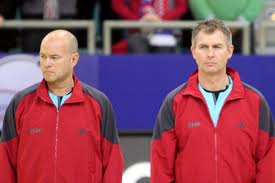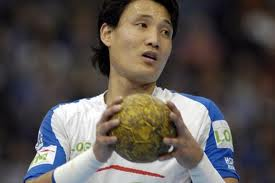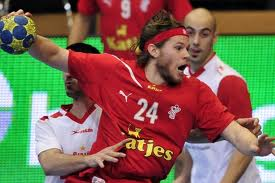
Norwegian referees Abrahamsen/Kristiansen had a very solid EURO 2012 and confirmed this impression in the final
An event like EURO 2012, with a concentrated number of difficult games involving the best referees of Europe, is often a good opportunity to take stock of both the overall quality of the current level of refereeing and of the specific situations and problem areas that may warrant attention. Therefore, even if undoubtedly both Sandor Andorka and his EHF colleagues, as well as my former IHF colleagues paid close attention to the referee performances, I hope that they will not mind my offering some unsolicited input. In doing so, however, I should note that the internet opportunities this time were not ideal, as there were many parallel games and the ‘on demand’ feature for watching games afterwards mostly functioned rather poorly.
I have already commented that the quality of play in EURO 2012 perhaps was not as high as one had hoped, and that many top players sometimes seemed to lack their usual energy and motivation. But from a refereeing standpoint, it may have been more relevant that an unusually high proportion of the games were very close and exciting in terms of final results. Also, there was some added excitement in the sense that there was not just a competition for EURO medals but also for a chance to obtain one of the slots in an Olympic qualifying tournament. Also, the format of EURO, where results are carried over to the next round, means that there are very few games where the results have less importance. All this contributes to put pressure on the referees, as does the reality that there were really TWO home teams with loud and fanatic spectators, namely Serbia and Macedonia.
Possibly this may have contributed to the feeling I had that in many games some of our most experienced referees showed a hint of being overly ‘diplomatic’ or cautious. Of course, while we want our referees to be bold and confident, essentially ‘whistling for what they see’, without worrying about the reactions to their decisions, we do not want them to be robots or in an ‘autopilot’ mode. They need to take into account the ‘temperature’ of the game and their decisions in previous similar situations, so that they can maintain consistency and control. But we do not want them to look as if they primarily think of how they can avoid problems for themselves with their decisions. By this I mean the tendency to interrupt quickly instead of giving advantage or letting a situation develop fully; or the temptation to whistle ‘cheap’ free-throws for the attacking team, instead of taking a tougher decision to give a 7-meter or a 2-minute penalty, or alternatively a decision in favor of the defenders.
There was a clear indication that the referees, collectively, had been instructed to pay more attention to offensive fouls. I agree with this approach, as it creates more fairness and balance and encourages the defenders to avoid excessive, desperate methods. And I saw many excellent decisions. But such a focus can be a bit dangerous, if it cannot be implemented with full consistency. There were now situations where it was impossible to understand how the referees could find reason to decide offensive foul, and on the other hand also clear such fouls that were not detected. So the good intentions were somewhat undermined by the difficulties in maintaining a clear line.
Similarly, many of the referee couples demonstrated a very good sense for detecting passive play, in part by being alert to the situations where there were tactical reasons for a team to ‘hold back a bit’. But it does not then look so good when other couples seem more ‘blind’ to the tactics that they should be able to detect. The same applies to the irritating habit of some players in being theatrical, in attempts to mislead the referees. This may involve pretending to have been fouled or at least exaggerating the impact. It is not enough to avoid falling for this behavior; you must also show that you do not tolerate it and even punish it. Some referees did not handle this firmly enough.
The decisions involving personal punishments was clearly the main area where ‘diplomacy and caution’ entered into the picture. It becomes a bit too obvious, when the referees are very correct and systematic early in the game with the ‘yellow cards’ and the 2-minute penalties, but then later on, in the critical phase of a close game, they seem to close their eyes also in the case of dangerous and careless fouls. This may involve pushing against jumping or running players, or it may be related to ‘wrestling’ against the pivot on the 6-meter line. Players will lose respect for the referees if they see such situations where the courage is lacking.
Another temptation for ‘diplomacy’ exists when the referee does not really see if a defender is inside our outside the 6-meter line when facing a jump shooter. Somehow, it seems as if the referees find it easier(!) to give a 7-meter than to call an offensive foul. But I also think the referees (and perhaps the instructors) may ‘forget’ the wording of rule 6:2c: “entering the goal area does not mean just touching the goal-area line, but clearly stepping into the goal area”.
Finally, a specific situation where more work seems needed by both instructors and referees involves the shots from the wings. It is a situation where it is difficult to see clearly ‘who is doing what to whom’, but I also sense that clearer instructions are needed. The wing players more and more seem to be in the habit of getting (too) close to the defender, even intentionally trying to gain an advantage by causing body contact, rather than avoiding such contact. Often this is taken too far, and it causes an unfair disadvantage for the defender, or it leads to an unwarranted 7-meter decision. But sometimes it is just the opposite: the attacker does nothing wrong, and the defender seems to be passive with the arms down along the body, but a perfectly timed turn of the body makes the defender puts his shoulder into the shooter at the critical moment.
All in all, I do not have major concerns about the collective performances at EURO 2012, but I had probably hoped to see more consistency from one couple to another, and more convincing performances from the relatively more experienced couples. After all, most of the couples, although generally of a ‘new generation’, have already gained some experience from big events. But it is also a bit of the same situation as in the past: one or two problem areas from recent years are being handled better than before, but then instead some new situations (or supposedly resolved ‘old’ issues) are (re)appearing… The task of the referees is not easy, and neither is that of their instructors and observers!











